The CSP has told Assembly members in Northern Ireland that unions are central to workforce planning for a transformed NHS.

Unions in Northern Ireland have told an Assembly health committee hearing to involve them sooner and at a higher level in workforce planning to ensure the Transforming Your Care (TYC) programme delivers for patients.
The committee, examining workforce needs for Northern Ireland's plans to shift more NHS services into the community, heard that trade unions needed to be included at strategic level, for example the Regional Workforce Planning Group.
Claire Ronald, CSP senior negotiating officer speaking as vice chair of the Northern Ireland Congress of Trade Unions health committee, said:
'The feeling is that we are being actively excluded from the workforce planning system and TYC despite asking at the earliest opportunity if we could be at the table and involved in those decisions.'
The 'flawed', complex system meant that staff with good ideas often did not know how to feed them into influencing service improvements, Ms Ronald told the Committee for Health, Social Services and Public Safety that comprises 11 MLAs from a range of parties.
Stop workforce planning in silos
She added: 'If you truly want to transform delivery, you need to look slightly differently at how you plan your workforce. If, as trade unions and professional bodies, we are not in at the highest level, we cannot influence the decisions that are made.'
Ms Ronald argued workforce planning was carried out in 'silos' and called for a focus on patient pathways or journeys instead of specific staff groups. That would help focus minds that part of the solution to the current shortages of GPs lies with physiotherapy self-referral.
'Self-referral for physiotherapy was postponed under TYC and is starting only now,' Ms Ronald noted, referring to the South Eastern Trust pilot, which she argued was an unnecessarily cautious approach as there was already strong evidence from elsewhere in the UK to show direct access to physiotherapy saves money and cuts waiting times.
Ms Ronald also highlighted staff concerns that TYC was a back door means to privatise the NHS, pointing out that in Northern Ireland 'a firm stance not to outsource the NHS is still not imbedded', while a culture of 'short term funding" was detrimental to planning.
Seven day services push with burnt out staff
Finally, she touched on plans for seven day services even while there was very poor data on current levels of 'unmet need'.
Ms Ronald said: 'We have physios working to prioritisations that were drawn up for a flu pandemic. That is what they are working at from Monday to Friday, and now they are asked to look at seven-day services. You cannot take a service that is not functioning over five days, or is functioning at crisis levels, and expect it to do seven.'
'There is a tendency for health professionals to put the patient above themselves, and I think that you can see that in the rise in sickness absence levels. Staff are just getting totally burnt out from trying to do everything.'



































